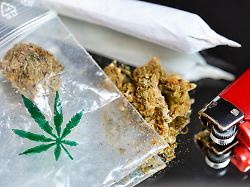The previous ban policy was disproportionate and ineffective. Legalizing cannabis without making it possible to purchase it is also wrong: the government factions are removing the cannabis trade from the few remaining controls and achieving the opposite of the alleged protection of minors.
The traffic light parties want to pass the legalization of cannabis in the Bundestag today, unless the skeptics in the SPD parliamentary group overturn the law. The Union firmly rejects the release of this drug. But those who reject legalization outright should offer a plausible alternative to the status quo.
The current sanctions regime has failed: millions of otherwise blameless citizens live under constant, completely disproportionate threat of punishment, while the already busy police and judiciary are pointlessly occupied with petty crimes. Marijuana products are easy and cheap to purchase across the country – and are often contaminated in a way that poses a health risk. Organized crime earns money; also on children and young people who come into contact with the drug all too easily. Cannabis is potentially particularly harmful to adolescents. A different drug policy is actually needed, but the traffic light government has strayed into a dangerous law.
The cannabis legalization law is likely to miss two central goals that traffic light representatives such as Federal Health Minister Karl Lauterbach are promoting: improving child and youth protection and curbing the black market. This is due to a fundamentally flawed design. Due to current EU law, the licensed dispensaries originally agreed in the coalition agreement are not feasible. Nobody will be able to legally buy cannabis in Germany. If you want to smoke weed in the future without breaking the law, you have exactly the following options: firstly, to grow cannabis in your own home, secondly, to join a cultivation club and actively participate there, thirdly, to smoke from the joint of a friend who gets his weed from one of these sources , but is not allowed to pass it on. The first two options may be viable for regular consumers. However, most stoners in Germany only consume it occasionally.
There is a risk of loss of control
The law will foreseeably give you the option of a black market that is flourishing more than ever. In view of the high permitted quantities of possession, permitted home cultivation and legal consumption outside of certain protected areas (pedestrian zones, around schools and playgrounds), there is suddenly hardly any police action against dealers. The Association of German Criminal Police Officers, which fundamentally supports the decriminalization of consumers, also warns of this. The risk for criminal cannabis entrepreneurs drops drastically with the legalization law; Prices are likely to fall and supply to increase – especially for those under 18.
Especially since the regulation of cultivation associations is full of holes: it is simply impossible for a supervisory authority to retrospectively check how many flowers a single harvested plant produced in grams. Everything from double-digit grams to a whole kilo of marijuana is included. The supervisory authority can only check formal compliance with logging rules or the appointment of a qualified prevention officer. The requirements of the cultivation associations are burdensome for those who want to do everything correctly, but easy to circumvent for those who grow cannabis fraudulently.
Schnapps would be the right role model
The susceptibility to abuse also applies to the limitation of private cultivation to three plants, as appealing as it may sound for cannabis fans to grow and harvest a plant at home. More control would be established through exclusively licensed production and distribution points and consistent prosecution of all other cultivation and distribution channels. It would be comparable to how we deal with schnapps, which is not allowed to be distilled privately.
The weak points in the law listed – and there are more – may not lead to a cannabis glut and open up a billion-dollar market for organized crime. But they neither improve youth protection nor reduce drug-related crime. This is not only dangerous, but also undermines the population’s acceptance of the fundamentally sensible cannabis legalization. The advocates of the law point out that the effects of legalization should be evaluated. If youth consumption increases, the law will be put to the test again, which is what the traffic light internal compromise wants. This fits well with the fact that the entire law is a compromise between the original intent and what is legally possible – a very poor compromise.
